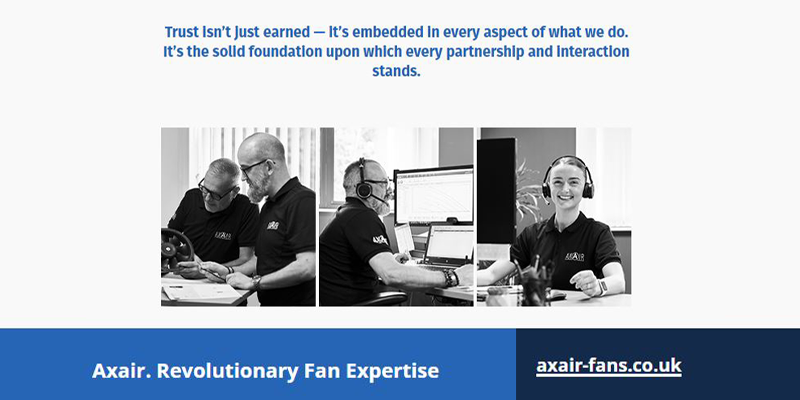
07 February 2025 | Axair Fans
Trust: The Most Underestimated Aspect of Customer-Supplier Relationships
Trust is the cornerstone of all successful business relationships, and yet it often remains the most underestimated aspect of customer-supplier interactions. Andrew Jones, Technical Director at the Axair Group, discusses how trust carries the most leverage in long lasting relationships.
In our line of work as industrial fan suppliers, we’ve come to understand that trust is not merely a byproduct of a transaction, it’s an outcome cultivated through consistent, value-added engagement. Much like an invisible thread, trust binds us to our customers, enabling stronger partnerships, smoother problem-solving, and mutual growth.
In this article, I’ll talk about why trust is essential in a technical and consultancy-driven field like ours, how it fosters loyalty, and how a customer-centric approach can reinforce this invaluable connection. If any of my customers who’ve personally experienced the value-added approach we offer, I’d love to hear your thoughts once you’ve read this.
The industrial fan landscape has evolved rapidly, and today’s fan customers expect more than just products, they seek solutions, something I’m sure you’ve heard me say many times before. For years, 32 to be exact, our business was primarily about delivering high-quality fans and related components, ensuring timely supply, accurate selections, and competitive pricing. But as customer needs grew more complex, so too did our role.
We recognised that integration problems, be they inefficiencies, noise, or mismatched specifications, often arose, not because the fans were inadequate, but because of a lack of deeper understanding of mechanical fan component know-how, even though there was often a thorough understanding of the systems they were meant to support. Addressing this gap required us to transcend the transactional nature of our work and step into a consultative role.
This transformation wasn’t just about expanding our services. It was about positioning ourselves as a trusted partner, both as a brand and as individuals who held relationships with individual customers. Customers needed to see us as more than suppliers, they needed to believe that we understood their challenges, had their best interests at heart, and could deliver solutions tailored to their specific needs. Trust, in this context, became the foundation for this transition from transactional to relational.
Technical consultancy, troubleshooting, and on-site diagnostics have become the bedrock of our value-added services. But technical expertise alone doesn’t guarantee trust. In fact, even the most skilled fan engineers and first line technical supports can fail to win customers over if they lack the empathy and communication skills needed to connect on a human level.
When I visit a customer’s site to diagnose an issue, my first task is not to point out what’s wrong or how to fix it, it’s to listen. Active listening allows us to understand the pain points from the customer’s perspective, even if they lack the technical vocabulary to articulate them fully. This act of listening is one of the first threads of trust we weave. This one is so important that it’s one of our internal core brand values, I’ve spoken about them before, the blueprints of how we expect our entire team to act, how they embody the Axair brand by being “Attentive & Focused” through active listening.
Once we’ve built rapport, we focus on clear, transparent communication. Explaining not only the problem but also the thought process behind our solutions helps to demystify complex technical issues and empowers the customer to make informed decisions. In doing so, we demonstrate our commitment to their success, rather than simply pushing a product or service.
While much of the discourse around trust emphasises the supplier’s role, it’s essential to recognise that trust is a two-way street. As we strive to build trust with our customers, we also place trust in them, trust that they’ll provide accurate information about their systems, trust that they’ll follow through on agreements, and trust that they’ll see the value we bring to the table.
This mutual trust fosters collaboration, enabling both parties to work together toward long-term solutions rather than quick fixes. For example, when a customer trusts us enough to share their operational challenges openly, we’re better equipped to recommend fans that integrate seamlessly into their systems. Similarly, when we trust a customer to provide honest feedback, it helps us improve our services and refine our approach.
Over time, this reciprocal trust strengthens the invisible thread that ties us together, making it more resilient to the occasional strain or setback.
In an industry where products can often appear commoditised, trust becomes a powerful differentiator. Customers may have access to dozens of suppliers offering similar products at similar prices, but what sets a supplier apart is the intangible value they provide.
By embedding trust into every interaction, be it a site visit, a phone call, or a written report, we elevate ourselves from being just another supplier to being an indispensable partner. This trust isn’t built overnight; it’s the result of consistent reliability, integrity, and customer-focused actions.
When customers trust us, they’re not just buying a fan; they’re investing in peace of mind. They’re choosing a partner who will stand by them, anticipate their needs, and help them navigate challenges with confidence. They may just gain a new friend who loves old school land rover defenders, motorbikes and fixing things, our relationships are much more than just fans.
The invisible thread of trust may not always be visible, but its presence is undeniable. It’s what transforms a business relationship into a partnership, a transaction into a collaboration, and a customer into an advocate.